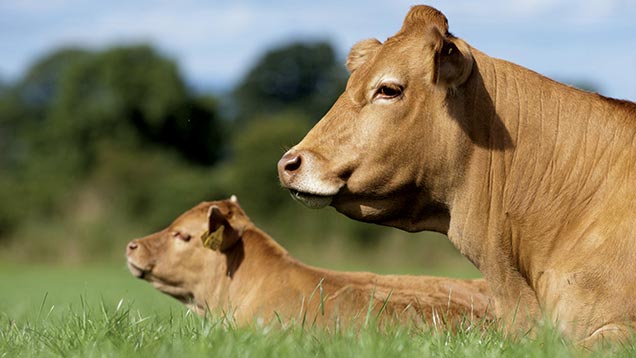New ear tag can detect early onset of cattle pneumonia
 © Wayne Hitchinson/Rex
© Wayne Hitchinson/Rex Early treatment of respiratory disease in cattle is vital in increasing the response to medication, minimising production losses, and is particularly important in calves.
An innovative ear tag designed by Richard Crider, a Texan cattle rancher’s son, detects a raised temperature pattern and alerts the stockperson up to 72 hours before the animal shows signs of respiratory disease.
And for the first time, the new tag technology is available for UK beef and dairy farmers.
See also: Livestock farmers’ picks of useful precision technology
Tim Farrow, managing director of TMF Milk Feeders and sole distributor of Fevertags in the UK, said: “If you can get on top of disease quickly, you can reduce mortality.”
The integrated software learns the typical temperature activity of the animal and only alarms if the temperature remains high over a six-hour period and has proven 95% accurate in research trials.
“The animal’s temperature will go up and down, but will not drop below 39.7C if it has a respiratory infection,” said Mr Farrow.
Once the cow or calf has had a high temp for six hours, a light flashes on the tag to alert the farmer. The flashing light continues for six hours, after which point the device reverts to monitoring the temperature every 15 minutes.
However, if the temperature remains above 39.7C, the tag will continue flashing, so even if it first begins flashing just after the final evening checks, it will still be flashing the next morning if the temperature has remained high.
If the tag is reset, it will return to monitoring the six-hour preset pattern again, explained Mr Farrow, speaking at the Next Generation of Beef Farming event, a joint venture between the IFA, the Warwickshire Rural Hub and the NFU.
Research also showed 75% of animals with flashing tags went on to develop clinical signs of disease.
See also: How to install the Fevertag
In addition to allowing earlier treatment of conditions such as pneumonia, it is also useful to check the effectiveness of antibiotic treatment. During recent trials in Yorkshire, animals that were injected with antibiotics had flashing tags some eight to 10 hours later.
But Mr Farrow stressed the tags should not replace the experts.
“I don’t want vets to see it as undermining. The tags should be used as a management tool or to do what the farmer already does, only sooner.”
Each tag costs £15 and the battery has a two-year continuous life. The temperature sensor is adjustable and will fit any size animal. The tags can be fitted with standard ear taggers, are reusable and can be reconditioned at a cost of £8-9.
Mr Farrow is currently looking for any interested UK farmers to trial Fevertags. Please email him for details at tim.farrow@tmfmilkfeeders.com.

